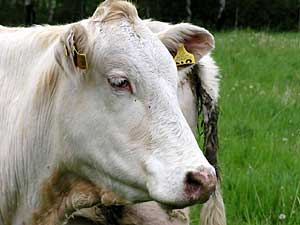|
Audio
Photos
|
July 20, 2005
More than 5,000 veterinarians are in Minneapolis for the annual meeting of the American Veterinary Medical Association. The national conference has shown that veterinary medicine is about a lot more than caring for cats and cows.
The incidence of new human diseases that start in animals have made vets more important to public health. And talk of bio and agriterrorism has put veterinarians on the front lines of national defense. But veterinarians say they aren't quite ready for that.
Minneapolis, Minn. — The best way to prevent a biological threat to the U.S. food supply is by keeping a tight lid on farms and ranches. That's what Kenneth Nussbaum from Auburn University's College of Veterinary Medicine told an audience of vets at the American Veterinary Medical Association's convention.
Food producers, he said, should only have one entrance to the farm and lock it, they should regulate any visitors to the farm and they should regularly clean and disinfect their equipment. Most importantly, they should report any suspicious activity around the farm to the authorities.
Although, the title of Dr. Nussbaum's lecture from Auburn included the word terrorism, he isn't sure if the next big threat will be intentional or accidental.
He said the biggest biological threat to our health and economy are a result of globalization and what he called an insatiable desire for exotic pets.
"Our problem is us," he said in an interview after the lecture. "We travel. We import food. We import pets. We don't live in a risk-free society. And I would suggest that we have to be prepared for the mistakes. Detecting and correcting the mistakes."
Mother Nature may be the biggest terrorist, according to Dr. Corrie Brown from the University of Georgia. She said you can't prevent these diseases as mush as respond to them.
"Governments today are only going to be judged on how they respond to incursions of disease rather than whether or not they prevent them," she said. "So from that perspective, whether a disease comes in intentionally or accidentally, our response is going to be the same."
That doesn't mean you can't reduce how vulnerable the food industry is, or improve the cooperation between different vets and state and federal agencies.
Brown said that although the chances are higher of an accidental disease outbreak, the specter of terrorism has helped vets get access to more money through homeland security. That's money they couldn't get before the Sept. 11, 2001, terrorist attacks and the following anthrax scare.
"Agriterror and bioterror have given us the two-by-four to get the funding we need to work to get the response systems in place," Brown said.
And when that response comes, there may be a demand for vets to play a new role as a bridge between ranchers, farmers and a variety of state and federal agencies. When there are disease outbreaks, like the hoof-and-mouth disease outbreak in Great Britain several years ago, the vets aren't just there for the animals.
"What was learned from the UK outbreak is that there is a great need after the outbreak to provide financial, emotional, and mental support," Nussbaum said. "And obviously veterinarians can't do that, or all of that. But they can be leaders in the community to develop those support links."
But Nussbaum said most vets aren't interested in these larger issues. He worries about how to entice veterinary students to focus on areas like researching animal diseases.
Dr. Lonnie King at the Centers for Disease Control and Prevention said too many young vets and veterinary students are city kids. They're interested in caring for dogs and cats, where they make a nice living, rather than taking on less lucrative areas like research or public health.
"We don't have enough young veterinarians and students that are interested in those kinds of careers," King said. "And we need to stimulate and incentivize them to get involved. Because there is a growing demand."
King said there is pending legislation that would give vet students a break on paying back school loans if they go into research or public health. And more universities with veterinary schools are starting public health programs.





